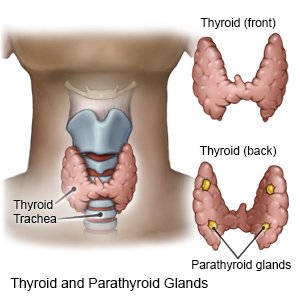Subclinical Hypothyroidism
Medically reviewed by Drugs.com. Last updated on Apr 6, 2025.
What is subclinical hypothyroidism?
Subclinical hypothyroidism is a condition that develops when your thyroid stimulating hormone (TSH) level is higher than normal. TSH is made in the brain and controls how much thyroid hormones are made. Thyroid hormones help control body temperature, heart rate, growth, and weight. Subclinical hypothyroidism can lead to hypothyroidism.
 |
What causes subclinical hypothyroidism?
- A family history of hypothyroidism
- An autoimmune disease, such as inflammation of your thyroid, or Hashimoto disease
- Surgery, radiation therapy, or medicines such as lithium, sedatives, or narcotics
- Thyroid cancer or viral infection
- Diabetes or other conditions that affect the pituitary, hypothalamus, or thyroid gland
What are the signs and symptoms of subclinical hypothyroidism?
Any of the following may develop slowly, sometimes over several years:
- Exhaustion
- Sensitivity to cold
- Headaches or decreased concentration
- Muscle aches or weakness
- Constipation
- Dry, flaky skin or brittle nails
- Thinning hair
- Heavy or irregular monthly periods
- Depression or irritability
How is subclinical hypothyroidism diagnosed?
Your healthcare provider will ask about your symptoms and which medicines you take. Tell your provider about your medical history and if anyone in your family has hypothyroidism. A blood test will show your TSH level.
Drugs used to treat this and similar conditions
Synthroid
Synthroid (levothyroxine) treats hypothyroidism (low thyroid hormone) and different types of ...
Armour Thyroid
Armour Thyroid is used for hashimoto's disease, hypothyroidism, after thyroid removal, thyroid ...
Ozempic
Learn about Ozempic (semaglutide) for type 2 diabetes treatment, weight management, cardiovascular ...
Levoxyl
Levoxyl treats hypothyroidism (low thyroid hormone) and treats or prevents goiter. Learn about side ...
Cytomel
Cytomel is used for hypothyroidism, after thyroid removal, myxedema, myxedema coma, thyroid ...
Tirosint
Tirosint is used for hashimoto's disease, hypothyroidism, after thyroid removal, myxedema coma ...
Nature-Throid
Nature-Throid is used for hashimoto's disease, hypothyroidism, after thyroid removal, thyroid ...
Unithroid
Unithroid is used for hashimoto's disease, hypothyroidism, after thyroid removal, myxedema coma ...
Euthyrox
Euthyrox (levothyroxine) is used to treat hypothyroidism and to treat or prevent goiter. Includes ...
Liothyronine
Liothyronine systemic is used for hypothyroidism, after thyroid removal, myxedema, myxedema coma ...
How is subclinical hypothyroidism treated?
Treatment depends on the amount of thyroid hormones in your body. You may need thyroid hormone replacement medicine to bring your thyroid hormone level back to normal.
Treatment options
The following list of medications are related to or used in the treatment of this condition.
Call 911 for any of the following:
- You have sudden chest pain or shortness of breath.
- You have a seizure.
- You feel like you are going to faint.
When should I seek immediate care?
- You have swelling in your legs, ankles, or feet.
- Your heart is beating faster or slower than is normal for you, or you feel restless.
When should I contact my healthcare provider?
- You have a fever.
- Your signs and symptoms return or become worse.
- You have pain, redness, and swelling in your muscles and joints.
- You have questions or concerns about your condition or care.
Care Agreement
You have the right to help plan your care. Learn about your health condition and how it may be treated. Discuss treatment options with your healthcare providers to decide what care you want to receive. You always have the right to refuse treatment. The above information is an educational aid only. It is not intended as medical advice for individual conditions or treatments. Talk to your doctor, nurse or pharmacist before following any medical regimen to see if it is safe and effective for you.© Copyright Merative 2025 Information is for End User's use only and may not be sold, redistributed or otherwise used for commercial purposes.
Learn more about Subclinical Hypothyroidism
Treatment options
Care guides
Symptoms and treatments
Medicine.com guides (external)
Further information
Always consult your healthcare provider to ensure the information displayed on this page applies to your personal circumstances.
